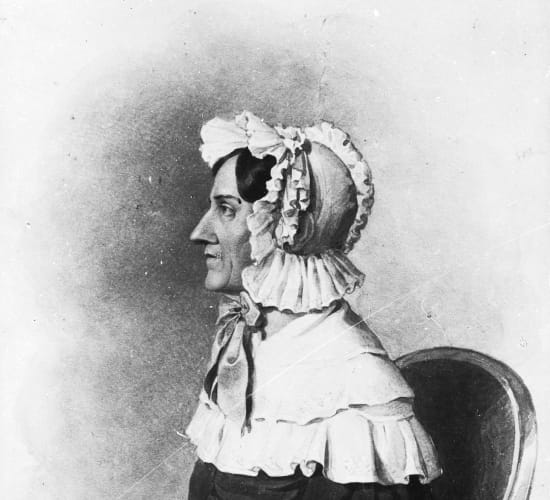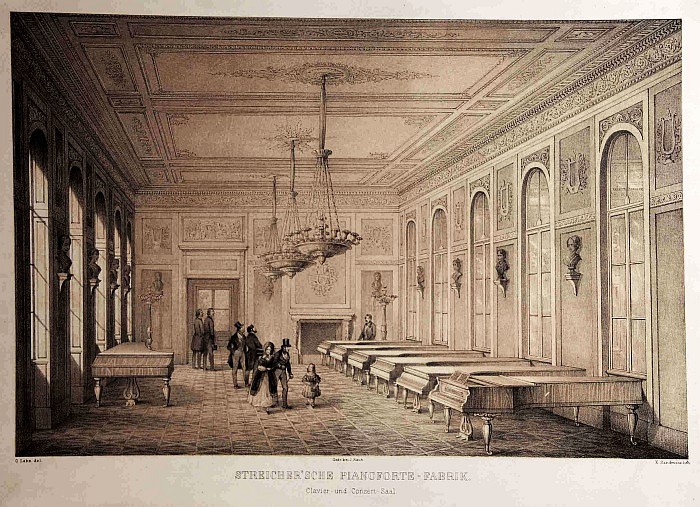Women in Music: Nannette Streicher, Beethoven, and the Hammerklavier Sonata

Background: Augsburg and Vienna
Maria Anna (Nannette) Streicher (1769-1838) was a piano maker, composer, teacher, and writer who is perhaps best known for her Viennese pianos and for her friendship with Beethoven. She was born in Augsburg in 1769 into a family of musicians, and her father – Johann Andreas Stein (1728-1792) – was a renowned German piano maker. Nannette gave her first recital in 1776 in Augsburg at the age of 7, and performed for Mozart a year later. Nannette and her father were discussed by Mozart and his father in a number of letters. Although Mozart wrote of Nannette’s heavy technique, lack of steady pulse, and her grimaces and performance manner, he also stated that ‘she may succeed, for she has great talent for music’. She may have met Beethoven as early as 1787 on his abortive trip to Vienna to meet Mozart, upon the news of what would become his mother’s fatal illness. Indeed, Nannette’s experience of playing for Mozart alongside the circumstances of Beethoven’s trip to study under the composer may have roused Nannette’s sympathies for Beethoven, becoming a significant underpinning of their relationship.

After the death of Nannette’s father in 1792, she married Johann Andreas Streicher (1761-1833) in 1794 and set up a piano firm in her name in the Landstrasse in Vienna. Their house became a centre for music gatherings, and was frequented by numerous leading musicians in Vienna, including Beethoven. The firm made pianos for Weber, Beethoven, Hummel, and later, Brahms. In Beethoven’s first known letter to the Streicher family (in this case to Nannette’s husband, Andreas), Beethoven praised the Streicher piano as a ‘really excellent instrument’, and that ‘the merits of your instruments should be recognised in this country and everywhere’. In the same letter of 1796, Beethoven also jested that the piano ‘robs me of the freedom to produce my own tone’, stating his praise for pianos which permit a rich, singing tone. Incidentally, the brochure given to Streicher piano buyers from 1801 closely mirrors Beethoven’s words on the criticisms of harp-like pianos and the importance of a singing tone. Here we find that Beethoven may not only have influenced the development of the Streicher pianos though his desire for a richer tone, but may also have indirectly contributed to the marketing of the pianos!
Relationship with Beethoven
The relationship between Nannette and Beethoven is documented in over 60 letters from Beethoven between 1816 and 1817. The letters were in Nannette’s collection upon her death, however, little or no correspondence exists from Nannette to Beethoven. Despite the one-sided nature of the correspondence, one is still able to discern various characteristics of their relationship. The first existing letter from Beethoven to Nannette is typical of the others in many respects, whereby Beethoven writes to organise a get-together when he is feeling better. Beethoven’s ill health, cancellations, and apologies are frequent in his letters to Nannette. His complaints of ill-health are often accompanied by concern for his worsening hearing, as well as complaints about the weather. It is possible that Beethoven was feeling quite depressed in this period, and his concern over the legal dispute surrounding the raising of his nephew may well have been a contributing factor.
Beethoven surely stirred Nannette’s sympathies, as after asking her to have an item of clothing mended, the next letter states: ‘I am making use of your permission to send you the laundry so that you may kindly attend to this’. This suggests that Nannette offered to help Beethoven with his housekeeping, and indeed Beethoven’s language in the ensuing letters often evokes sympathy, even pity. He writes, ‘I have always helped other people when I could’, in one form or another and on numerous occasions, and that, ‘how one feels when one is uncared for… can only be known from experience.’ Beethoven seems to allude to Christian fellowship in a number of letters, and on one occasion discusses the aspects of the Sabbath, marriage, the gospels, and ‘love one another’ in rapid succession.
Nannette has often been described as a mother figure to Beethoven, and indeed it would seem that the patience, care, and perhaps even the love required to sustain Beethoven’s requests and frequent cancellations at this time attests to this. Beethoven also asked to borrow money from her on a number of occasions (which was often repaid late), and he seemingly asked her to calculate the distances of rooms he was considering letting in relation from the town. Numerical issues were common for Beethoven throughout his life, and may well have been a contributing factor to the difficult situation he found himself in: he seemed to rely on servants to meet his daily needs, but struggled with the expense.
The relationship between Nannette and Beethoven was not without humour, however, as in one such letter Beethoven plays on Nannette’s marital and maiden names (Stein, meaning ‘stone’; and Streicher, meaning ‘prank’), as indeed Mozart did on the name ‘Stein’ in his letter to his father. Beethoven’s criticisms of his servants also read wittily: ‘May God grant that I shall not have to talk, write or think any more about them. For in the sphere of art [,] swamp and slime are of even more use to a man than all that damned nonsense!!!’ On another occasion, Beethoven merely states of a servant that, ‘this person can’t even think’!
Beethoven’s frustration at times boarders on helplessness, for example, when he writes: ‘What would happen if you fell ill or were away from home’, or, ‘I am very much annoyed by everything’. In the latter example, it seems that Beethoven’s problems and struggles were highly conflated and without solution. Nannette was someone that would listen, if not provide solutions, as she had done in many forms, including providing a housekeeper.
Nannette’s Contributions to Beethoven’s Productivity
In this respect, the help that Nannette offered Beethoven during this period was significant, and is worthy of attention. According to Barry Cooper, Nannette was the ‘only woman who figured in Beethoven’s life in a positive way after he adopted Karl in 1815’. Dennis Matthews describes Nannette as a ‘power of strength in helping to sort out his domestic disorders’. The manifestations of Nannette’s help to Beethoven can, however, be further developed with regard to his creative outputs.
In 1988 the New Zealand MP and economist Marilyn Waring (1952- ) published a seminal book, If Women Counted: A New Feminist Economics. Her conclusion was that Gross Domestic Product (GDP) systematically under-reports the work performed by women, with the premise that GDP excludes the value of non-market activity, including housework and childcare, which she states is largely performed by women. In this respect, the outcomes of GDP can be said to be greatly supported by the work of women who contribute value through various forms of (non-financial) care.
Early 1817 is widely regarded as a period of little productivity for Beethoven. However, in autumn of the same year, Beethoven had begun working on the Hammerklavier sonata, Op. 106, completing the first two movements by April 1818, and completing the work around August of the same year. Beethoven also made some sketches for the Ninth Symphony on 10 September 1817. Given the prominence of these works in Beethoven’s compositional output, and the help that he received from Nannette Streicher during this challenging period, we must consider the value that Nannette contributed to Beethoven’s life during this time. How much of Beethoven’s productivity when composing the Hammerklavier – and indeed his other works – is due to the help he received from Nannette? Indeed, Beethoven seems to have acknowledged Nannette’s contributions when he wrote: ‘I am in so many respects your debtor that when I think of it I am frequency overcome by a feeling of shame.’
Conclusion
It seems that Nannette provided much support for Beethoven during this period. How much of this support Beethoven returned to Nannette is unclear, though his feeling of shame seems to indicate a feeling of indebtedness, if not gratitude. Maynard Solomon suggested that Beethoven’s relationship with Nannette came under strain from late 1817, and that their correspondence ended in 1818, ‘never to be resumed’. Solomon did not, however, have access to Beethoven’s conversation books, which the composer used to aid communication when he became profoundly deaf. Numerous entries show that Beethoven and Nannette were in contact from shortly after the last existing letter up until Beethoven’s death.
The conversation books show that Nannette was learning the Hammerklavier sonata in late 1819, when she was apparently struggling to learn the first movement. This is affirmed by an entry from Nannette in April 1820 when she asks Beethoven to help her with the Hammerklavier sonata. Nannette’s name is also mentioned in the conversation books with regard to mending clothes as late as 1823, and so she may well have helped Beethoven with housekeeping well into the latter stages of his life. Solomon states that Nannette’s husband visited Beethoven upon the composer’s mortal illness, and suggests that Nannette’s absence is further indication of the supposed strain on their relationship. A conversation entry from 1827, however, states that the Streicher family – with specific mention to Nannette – sent Beethoven ‘a warm greeting’. In light of the evidence from the conversation books, it would seem that the relationship between Beethoven and Nannette carried well beyond 1818, and that Nannette and Beethoven were life-long friends.
Nannette’s friendship and support for Beethoven was surely a source of solace, comfort, and support for him, and almost certainly aided his productivity and creative output. Incidentally, Nanette’s grave in Vienna is located opposite Beethoven’s as though she is still watching over him! Nannette’s contribution to music, however, clearly goes beyond Beethoven. According to her husband, ‘it was she alone who, for ten years, through her hard work and skill’ continued to develop her piano business. Her commitments and contributions were numerous and manifest through generations of music-making through her compositions, instruments, motherhood, teaching, and, of course, through her contributions to Beethoven.
This article first appeared in the April 2020 issue of Piano Journal published by the European Piano Teachers’ Association.






